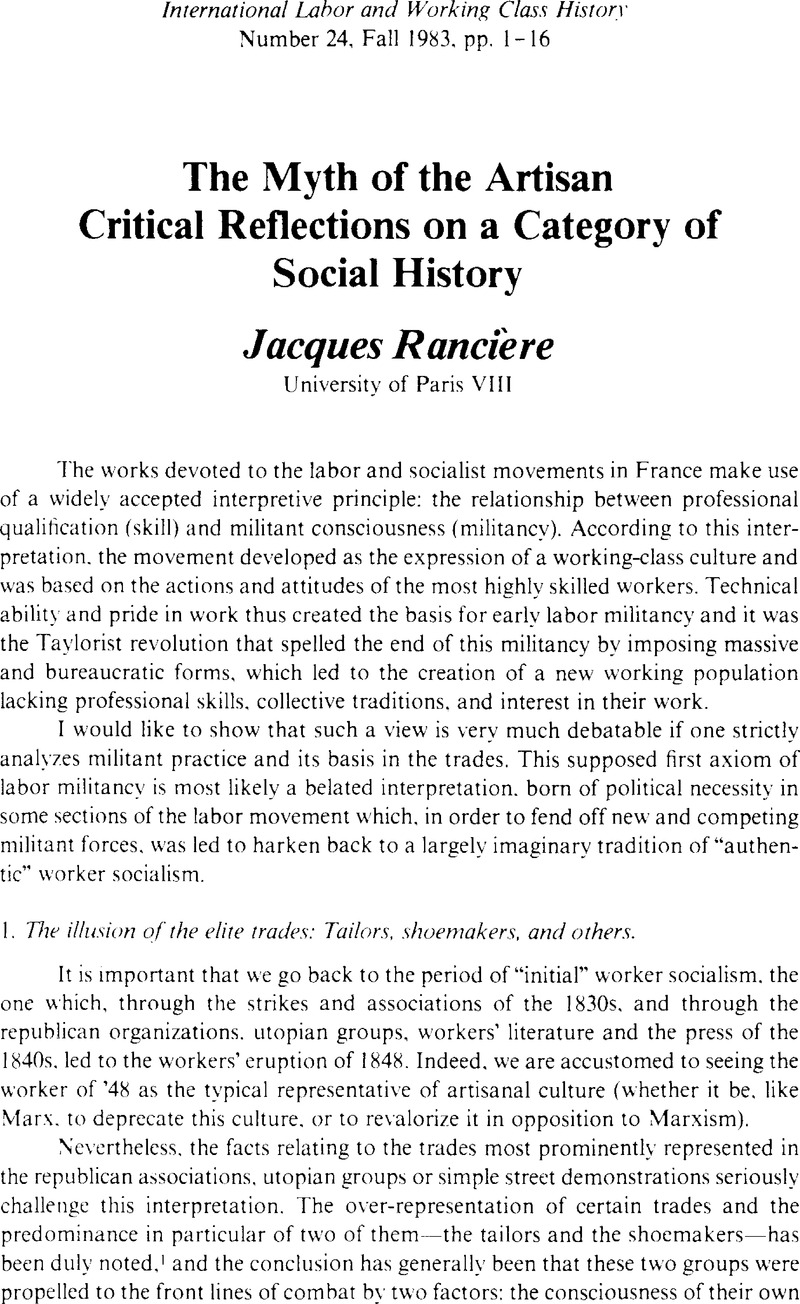Article contents
The Myth of the Artisan Critical Reflections on a Category of Social History
Published online by Cambridge University Press: 16 December 2008
Abstract

- Type
- Scholarly Controversis
- Information
- Copyright
- Copyright © International Labor and Working-Class History, Inc. 1983
References
NOTES
* This work was first presented at a conference on “Representations of Work in France.” organized by the Western Societies Program at Cornell University in April. 1983. The proceedings of the conference will be published by Cornell University Press in 1984 85. The translation is by David H. Lake of Vassar College.
1. This fact is particularly stressed by Johnson, Christopher H. in Utopian Communism in France: Cabel and the Icarians (Ithaca, 1974)Google Scholar as well as in his contribution to Price, et al. , Revolution and Reaction: 1848 and the Second French Republic (London, 1975)Google Scholar.
2. Leneveux, H., Le Travail manuel en France (Paris, n.d.), 166Google Scholar.
3. Piron, , “La Fete de braves,” in Le Chansonnier du Tour de France (Paris, 1840)Google Scholar. See. in the same collection, “Les braves” and “Réception d'un compagnon cordonnier.”
4. Viollet, Alphonse, Les Poètes du peuple au XIXe siècle (Paris, 1846), 87Google Scholar. The reference is to the poet and shoemaker from Reims, Gonzalle.
5. See the report of the tailor Deluc from Bordeaux that accompanies his project for an association (Archives Nationales. F12 4631).
6. Viollet, A., Poètes du peuple. 3.Google Scholar
7. Gilland, J. P., “Biographie des hommes obscurs, André Troncin.” La Feuille du Village, November 28. 1850Google Scholar.
8. Hilbey, Constant, Rèponse à tous mes critiques (Paris, 1846). 51Google Scholar.
9. Vinçard, Pierre, “Les ouvriers tailleurs,” Le Travail afftanchi, Januray 7. 1849Google Scholar.
10. See the analyses of the master tailor Canneva, in his newspaper. La Fashion.
11. La Fashion. April 20. 1842Google Scholar.
12. Monneret, . Hygiène des tailleursGoogle Scholar, published as a supplement in August Canneva, , Le Livre du tailleur (Paris, 1838).Google Scholar
13. On the forms of mutual aid among the curriers, see Travail, Office du, Les Associations professionnelles ouvríeres (Paris. 1900), Vol. II, 193Google Scholar.
14. On the groups of Saint-Simonian workers, see the archives of the Arsenal (Fonds Enfantin. especially dossiers 7815 and 7816) and the second part of my book. La Nuit des Proletaires (Paris. 1981)Google Scholar.
15. Vinçard, Louis. Mémoires épisodiques d'un vieux chansonnier saint-simonien (Paris, 1879).Google Scholar
16. Letter from Ruffin to Michel Chevalier. Fonds Enfantin, Ms. 7606.
17. On all that follows, see Perdiguier, Agricol, Biographie de l'auteur du Livre du Compagnonnage (Paris, 1846)Google Scholar.
18. The manuscripts of the carpenter Gauny. a unique account of a worker's life, are preserved in the Bibliothèque Municipal de Saint Denis. I have collected the most significant of these texts in the following volume: Gauny, Gabriel. Le Philosophe plébéien (Paris, 1983)Google Scholar.
19. Corbon, Anthime. Le Secret du peuple de Paris (Paris, 1863)Google Scholar.
20. Vinçard, . Mémoires épisodiques. 95Google Scholar.
21. For the scoffers, see Couannon, . Journal des Marchands Tailleurs (1835–1847) and his Le Parfait Tailleur (Paris. 1852)Google Scholar.
22. Cf. Gauny, Gabriel, “Le travail à la tache.” in Le Philosophe plébéien, 44–49Google Scholar.
23. Poncy, Charles, “A Béranger.” Le Chantier (Paris. 1844)Google Scholar. See also my article “Ronds de fumée: les poétes ouvriers dans la France de Louis-Philippe,” Revue des Sciences Humaines 190 (April June 1983)Google Scholar. In his book, Work and Revolution in France (Cambridge. 1980), William H. Sewell also analyses Poncy's poetry, but from a rather different standpoint.Google Scholar
24. Statistique de l'Industrie à Paris (Paris. 1851). 61Google Scholar.
25. La Parole ouvíere. 1830–1851. texts assembled and presented by Alain Faure and Jacques Rancière (Paris, 1976)Google Scholar.
26. Rancière, . La Nuit des Prolétaires, chapter X.Google Scholar
27. Faure, and Rancière, , La parole ouvrière. 287Google Scholar. On this question, one must of course consult the fascinating analyses of Gossez, Remi (Les ouvriers de Paris [La Roche-sur-Yon. 1967])Google Scholar, while avoiding the temptation to see in the worker organization that he presents a foreshadowing of revolutionary unionism.
28. Poulot, Denis. Le Sublime: ou le travailleur comme il est en 1870 et ce qu'il peut ètre. reedited and with an introduction by Cottereau, Alain (Paris, 1980)Google Scholar and Duveau, Georges. La Vie ouvriète en France sous le Second Empire (Paris. 1946).Google Scholar
29. On this point see Cottercau's, Alain introduction and the debate caused by that introduction in Les Revoltes logiques 12 (Summer 1980).Google Scholar
30. See Barberet, Joseph, Le Travail en France, Monographies professionnelles (Paris, 1886–1890)Google Scholar. and du Travail, Office. Les associations professionnelles ouvrîeres (Paris. 1899–1904)Google Scholar.
31. La Vie ouvrière. March 5. 1913Google Scholar.
32. Cf. Rancière, J.. “De Pelloutier à Hitler. Syndicalisme et Collaboration.” Les Révolies logiques 4 (Winter 1977)Google Scholar.
33. Michel Collinet's influence is clear in the Sartrean analysis of anarcho-unionism (see Les Communistes et la Paix and Critique de la Raison Dialectique) as well as in the writings of André Gorz. both of whom inspired others. Bernard H. Moss stresses his indebtedness to the analyses of Collinet, Michel and Touraine, Alain (L'Evolution du travail ouvrier aux Usines Renault [Paris. 1955])Google Scholar in his work. The Origins of the French labor Movement: The Socialism of Skilled Workers (Berkeley. 1976)Google Scholar.
34. Mauss, Marcel. “La Nation.” Oeuvres (Paris. 1968), vol. III. 579.Google Scholar
- 19
- Cited by




